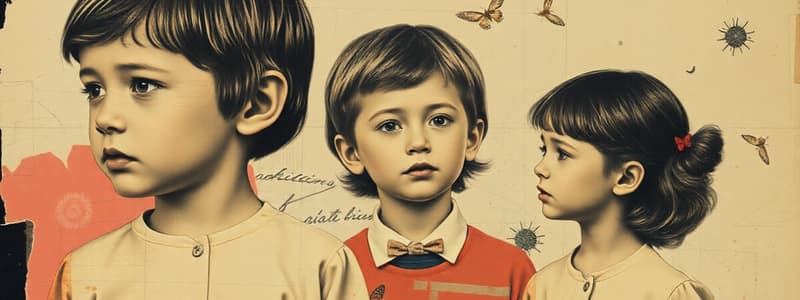Podcast
Questions and Answers
Which developmental stage is MOST characterized by rapid physical growth, sensory development, and initial social bonding?
Which developmental stage is MOST characterized by rapid physical growth, sensory development, and initial social bonding?
- Early Childhood
- Adolescence
- Middle Childhood
- Infancy (correct)
During which stage of development do peers have the MOST significant influence on identity formation and social behavior?
During which stage of development do peers have the MOST significant influence on identity formation and social behavior?
- Adulthood
- Early Childhood
- Infancy
- Middle Childhood and Adolescence (correct)
A child is observed struggling with logical problem-solving and academic learning. According to typical developmental milestones, in which stage is this child MOST likely?
A child is observed struggling with logical problem-solving and academic learning. According to typical developmental milestones, in which stage is this child MOST likely?
- Middle Childhood (correct)
- Adolescence
- Infancy
- Early Childhood
Which of the following BEST describes the role of family in the early stages of socialization?
Which of the following BEST describes the role of family in the early stages of socialization?
A school implements a new program focusing on positive peer relationships and social skills. This initiative PRIMARILY addresses which socialization process?
A school implements a new program focusing on positive peer relationships and social skills. This initiative PRIMARILY addresses which socialization process?
Which aspect of education is MOST directly associated with the development of skills like empathy and self-awareness?
Which aspect of education is MOST directly associated with the development of skills like empathy and self-awareness?
How does parental involvement in education MOST significantly impact a child's academic performance?
How does parental involvement in education MOST significantly impact a child's academic performance?
A child demonstrates a high level of self-awareness and empathy. Which aspect of emotional growth is MOST evident in this child?
A child demonstrates a high level of self-awareness and empathy. Which aspect of emotional growth is MOST evident in this child?
Which of the following is the MOST direct impact of cultural norms on child-rearing practices?
Which of the following is the MOST direct impact of cultural norms on child-rearing practices?
A school implements a multicultural education program to promote understanding and adaptability. This initiative PRIMARILY addresses which aspect of cultural impact?
A school implements a multicultural education program to promote understanding and adaptability. This initiative PRIMARILY addresses which aspect of cultural impact?
Flashcards
Childhood
Childhood
The period of rapid physical, cognitive, and social changes.
Growing Up
Growing Up
The journey from infancy to adolescence.
Infancy (0-2 years)
Infancy (0-2 years)
Rapid growth, sensory skills, and emotional bonding.
Early Childhood (2-6 years)
Early Childhood (2-6 years)
Signup and view all the flashcards
Middle Childhood (6-12 years)
Middle Childhood (6-12 years)
Signup and view all the flashcards
Adolescence (12-18 years)
Adolescence (12-18 years)
Signup and view all the flashcards
Socialization
Socialization
Signup and view all the flashcards
Family's Role in Socialization
Family's Role in Socialization
Signup and view all the flashcards
Education
Education
Signup and view all the flashcards
Emotional Development
Emotional Development
Signup and view all the flashcards
Study Notes
- Childhood is a unique and crucial period of human development, characterized by significant physical, cognitive, emotional, and social changes
- Growing up encompasses the entire developmental journey from infancy through adolescence, marking the transition from dependence to increasing independence and maturity
Developmental Stages
- Infancy (0-2 years): Rapid physical growth, sensory and motor skill development, and the beginnings of social and emotional bonding
- Early Childhood (2-6 years): Development of language, symbolic thinking, and social skills through play and interaction
- Middle Childhood (6-12 years): Cognitive advances in logical thinking, problem-solving, and academic learning, as well as increased peer interaction and self-awareness
- Adolescence (12-18 years): Puberty, identity formation, abstract thinking, and the exploration of independence and relationships
Socialization Processes
- Socialization is the process through which children learn the norms, values, beliefs, and behaviors of their culture or society
- Family plays a central role in early socialization, providing initial values, beliefs, and emotional support
- Peers become increasingly important during middle childhood and adolescence, influencing social behavior, identity formation, and attitudes
- Schools socialize children through formal instruction, social interaction, and the enforcement of rules and norms
- Media, including television, internet, and social media, can significantly impact children's attitudes, beliefs, and behaviors, both positively and negatively
Educational Influences
- Education is a formal process of learning that aims to develop cognitive, social, and emotional skills
- Early childhood education programs can positively impact cognitive and social development, school readiness, and long-term academic achievement
- School environment, teaching quality, and peer interactions all influence academic motivation, performance, and social adjustment
- Educational inequality can arise from disparities in resources, school quality, and opportunities, impacting children's educational outcomes
- Parental involvement in education is positively associated with children's academic achievement and motivation
Emotional Growth
- Emotional development involves learning to recognize, understand, express, and regulate emotions
- Attachment theory emphasizes the importance of early relationships with caregivers in shaping emotional security and social competence
- Emotional intelligence, including self-awareness, empathy, and social skills, is crucial for social and academic success
- Adverse childhood experiences (ACEs) can have long-lasting negative impacts on emotional and mental health
- Resilience, the ability to bounce back from adversity, is an important factor in promoting emotional well-being
Cultural Impacts
- Culture shapes children's values, beliefs, behaviors, and social expectations
- Cultural norms influence parenting styles, child-rearing practices, and educational approaches
- Cultural differences can affect children's cognitive development, social interactions, and emotional expression
- Exposure to multiple cultures can promote cross-cultural understanding and adaptability
- Cultural stereotypes and discrimination can negatively impact children's self-esteem, identity development, and academic achievement
Studying That Suits You
Use AI to generate personalized quizzes and flashcards to suit your learning preferences.




